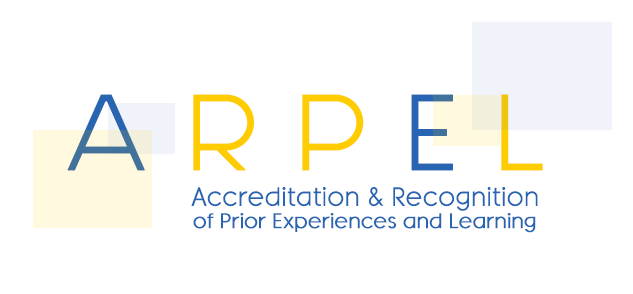Stage 1 – ARPEL4Entrep ARPEL Process
The focus of stage 1 – ARPEL4Entrep Bachelor’s in Entrepreneurship module is to encourage experienced entrepreneurs without any formal qualifications in business studies to pursue their studies and increase their level of expertise to make them more effective as entrepreneurs. The proposed ARPEL Bachelor’s Degree in Entrepreneurship enables them to accredit their prior formal, informal, non-formal learning and work experience as part of their coursework. For each of these four areas of activity an applicant can get up to 30 ECTS credits accreditation. However, overall an applicant can get accreditation up-to 90 ECTS credits. This will represent 50% of the 180 ECTS credits that must be obtained to earn the Bachelor’s degree in Entrepreneurship.
The following diagram illustrates the four steps in the ARPEL Accreditation Process and the manner in which at each step there is a deeper review and analysis of the information related to the learning and prior work experience activities.

Following are the steps to complete the online ARPEL Process – Stage 1 ARPEL4Entrep Bachelor’s in Entrepreneurship.
Step 1: System based collection of data
This step Identification of Prior Experiential & Learning Activities. The applicants need to furnish the information regarding their formal, informal, non-formal learning and work experience in this step.
Formal Learning – includes any formal and accredited qualifications/awards achieved by the applicants at EQF/MQF Levels 4, 5 and 6.
E.g. Diploma in Marketing (Level 4 – 60 ECTS)
Informal Learning – includes the recognition and accreditation of any informal learning activities undertaken such as non-accredited courses and CPD hours. Also any excess ECTS credits from formal learning, could also be accounted in this stage.
- Category 1: Non-accredited CPD hours for participation in formal seminars, conferences, etc to be translated in to ECTS study hours 25/1 ECTS credit on Formal Learning weightage.
E.g. Participation in a three day business conference (Level 5 – 18 CPD Hours)
- Category 2: Non accredited courses including onsite and online courses based on course duration to be translated in to ECTS study hours 25/1 ECTS credits on Formal learning Weightage.
E.g. Participation in Course era online short courses in Digital Marketing (Level 5 – 6 CPD Hours)
- Category 3: Private study with details of study programme and submission of appropriate project work (assignment, online interview etc).
E.g. Work-related assignment to research export opportunities to Dubai and relevant terms and conditions (20 CPD Hours)
Non-formal learning – includes any personal involvement in philanthropic, hobbies or other external interests, any personal triumph or challenge reflecting strength of character, leadership and perseverance and any other extraordinary life experience
- Category 1: Personal involvement in philanthropic, hobby, external interests
E.g. Reading of Biographies and Auto-biographies of Entrepreneurs and Industry Leaders i.e. Richard Banson, Bill Gates, Elon Musk, etc. / Viewing of Business-themed movies such as The Founder, American Story, Henry Ford, the Social Network, Steve Jobs, etc.
- Category 2: Personal triumph or challenge overcome reflecting strength of character, leadership, perseverance, etc.
E.g. Participation in Malta Marathon as part of Fund Raising Activities.
- Category 3: Other Extra Ordinary life experience
E.g. Voluntary work with Drug Rehabilitation Programmes led by Caritas.
Work experience – a minimum of 4 years of entrepreneurial work experience in middle management level is required for entry to the programme. Different categories of work experience are highlighted to distinguish between the type of experience gained at either middle or senior level and the type of responsibilities the applicant has fulfilled”.
Step 2: Data Substantiation
Applicants need to upload supporting documents for all claims made in this step 1.
Step 3: Evaluation and interview/s
The students can select the interview slot with the evaluators. Application and the interview will be evaluated and an Estimated ECTS will be calculated at this stage.
Step 4: Validation and issue of Credits
The validators will cross check and the application and equivalent Estimated ECTS will be assigned for the application.
Note -The students will be informed the estimated ECTS credits via email. Appeal policy is available for the students to resist in the ARPEL process.
Fee Structure: Click here to see Fee Details for ARPEL – Bachelor’s Degree Programme.
Erasmus+ co-funded programme offers a limited number of Full scholarships for Intake 1.
